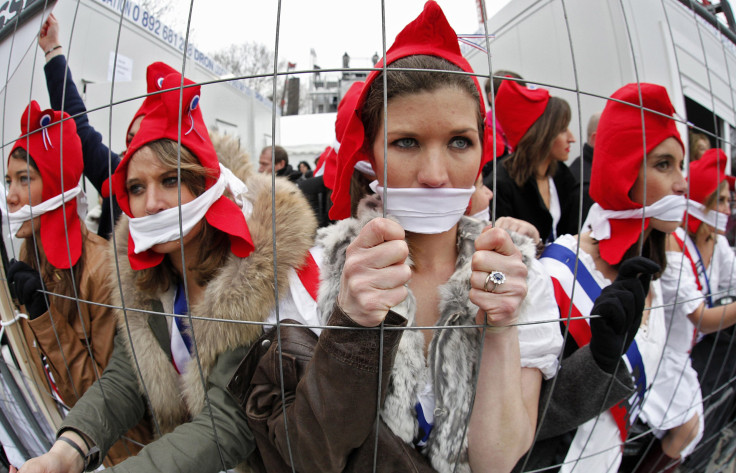Who Said France’s Catholic Church Is Dead? Huge Rally In Paris Opposes Gay Marriage

Conservative forces in France mobilized to express their opposition to same-sex marriage and adoptions by gay couples, before a bill allowing such measures appears for consideration in the Senate next month, following passage in the lower house of parliament by a large majority.
Hundreds of thousands marched in Paris on Sunday – some of the protesters were so vociferous that police used batons and fired tear gas to control or disperse the crowd, leading to a number of violent scuffles and dozens of arrests along with Champs Elysees, near the palace of President Francois Hollande, and other side streets. (Police had prohibited marchers from traversing the famed road that is always clogged with tourists).
Police have claimed that no more than 300,000 people attended the rally, while protest organizers countered there were well in excess of a million.
BBC reported that participants held up posters that read "We want work not gay marriage" and "No to gay extremism.” Some called for Hollande to resign, while others sang "La Marseillaise," France’s national anthem.
The new laws are likely to be passed since the Socialist Party of Hollande, who strongly embraces gay rights, and its allies dominate both houses. Public opinion polls also suggest the majority of the French support same-sex marriage, though they are less enamored with the idea of homosexual couples adopting children.
Protesters want the government to withdraw the bill entirely, or, if necessary, put it to a referendum.
A leading proponent of the antigay marriage movement, a Parisian socialite named Virginie Tellenne, who calls herself "Frigide Barjot" -- which means "Frigid Loony" and is a parody of the name of France’s most famous actress, Brigitte Bardot -- said the government should instead focus on joblessness.
"We want the president to deal with the economy and leave the family alone," Tellenne said, according to France24.
Indeed, unemployment n France is now at 10.6 percent, a 13-year high, according to Bloomberg, following a wave of layoffs at French automakers and other manufacturing firms.
Interior Minister Manuel Valls claimed that members and supporters of France’s far-right dominated the antigay crowd, while other media sources reported the demonstrators were heavily represented by the elderly, families with children and Catholic clergymen.
In any case, the show of solidarity against gay marriage by some quarters suggests that the Catholic Church remains a compelling cultural and institutional force in France, even if fewer people actually attend mass anymore.
Last year, Cardinal Andre Vingt-Trois, the archbishop of Paris, warned a group of French bishops in Lourdes that same-sex marriage "would be a transformation of marriage that would affect everyone" and amounted to a form of deceit.
“The Catholics are dispersed throughout the country, more heavily in the rural areas than in the urban centers, but nevertheless [are] geographically omnipresent,” said Douglas Yates, assistant professor of political science at the American University of Paris and professor at the American Graduate School in Paris.
“The Cathedral remains a pillar of the identity of most French cities, and the parish church the symbolic center of small town France. One of the most visible showings of French Catholics [are] the public protests against gay marriage that filled the streets of Paris. If those crowds are any indication, French Catholics have a voice equal to other social forces.”
© Copyright IBTimes 2024. All rights reserved.











